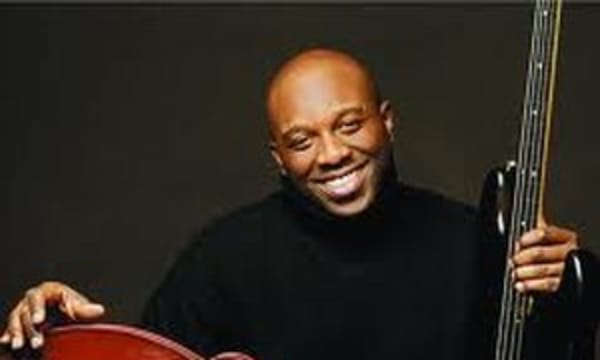Born on June 10, 1967, Charnett, his name a contraction of his father's (jazz drummer Charles Moffett) and jazz icon Ornette Coleman (whom Charles played with from 1965-1967). As a child prodigy he began playing in the Moffett Family Band at the age of seven with his three older brothers and sister Charisse Moffet (a singer). He appears on their 1974 self-titled recording for LRS Records. "My first teacher was my dad,� Charnett explains. �My first instrument was drums, then trumpet, and by age 8, I found myself playing the bass with the Moffett Family Band on a tour to the Far East. My approach to music is a bit more virtuosic than the norm because my training was unique. When I got to the bass, my dad didn�t start me on scales. My old man said, �Here are the low notes and here are the high notes � see what you can do with them.� That allowed me to immediately enjoy the quality of all the sounds, and that goodness triggered endorphins that affected my approach to music instead of starting out bogged down in restrictions and mathematics. That I started as a drummer makes me hear melodic music differently. When I play piccolo bass, I�m thinking more like a trumpeter, upright bass leads me to a traditional role for bass, and fretless moves me more toward the center.�Charnett attended Fiorello H. La Guardia H. S. for the Music and Arts in New York City and later studied at Mannes College of Music and the Juilliard School of Music. In 1983, he played on saxophonist Branford Marsalis' debut as a leader, Scenes in the City, and the following year he joined trumpeter Wynton Marsalis� quintet, appearing on 1985's acclaimed Black Codes (From the Underground). During the '80s, he also worked with Stanley Jordan, appearing on the innovative guitarist's best-selling 1985 Blue Note debut, Magic Touch, as well as two Blue Note albums with the late, great legendary drummer Tony Williams� quintet: 1987's Civilization and 1988's Angel Street. In 1987, Moffett signed with Blue Note Records and debuted as a leader that year with his first of three albums for Blue Note, Beauty Within, which featured his father Charles Moffett on drums, older brothers Codaryl Moffett on drums and Mondre Moffett on trumpet, Kenny Garrett on alto saxophone, and Stanley Jordan on guitar.In 1993, Charnett recorded Rhythm & Blood for Sweet Basil's Apollon Records. A savvy mix of jazz and pop, it placed high on the music charts in Japan. Moffett later scored artistic triumphs on the Evidence label with 1994's Planet Home (featured his audacious, electronically enhanced rendition of "The Star Spangled Banner" in tribute to Jimi Hendrix's Woodstock showstopper) and 1997's Still Life featuring keyboardist Rachel Z and drummer Cindy Blackman. In 1996, Moffett appeared on two simultaneous releases by Ornette Coleman's Sound Museum -- Hidden Man and Three Women. Another 1997 recording, Acoustic Trio for Teichiku Records, showcased Charnett's innovative acoustic bass playing. Three other '90s recordings for the Sweet Basil/Evidence label were done under the collective name of General Music Project (with saxophonist Kenny Garrett, pianists Geri Allen and Cyrus Chestnut, and his father Charles Moffett Sr., who passed away before the group could tour together). Another Charnett recording from 1995, Moffett & Sons, is a collaboration father. In 2001, Charnett released a potent tribute to the late Jaco Pastorius titled Mr. P, a trio recording with pianist Mulgrew Miller and drummer Lewis Nash. He has also performed on various movie soundtracks, including acclaimed ensemble cast pictures �Glengarry Glen Ross� (1992) and �The Visit� (2001), and was a featured soloist for �The Score� (starring Robert DeNiro and Marlon Brando).In addition to his albums as a leader and with the Manhattan Jazz Quintet, Charnett has performed and recorded with an impressive resume of greats that include Art Blakey, Dizzy Gillespie, Joe Henderson, Herbie Hancock, Pharoah Sanders, McCoy Tyner, Sonny Sharrock, Frank Lowe, Ellis Marsalis, Wallace Roney, Dianne Reeves, Kenny Kirkland, David Sanchez, Babatunde Lea, Arturo Sandoval, Alex Bugnon, Kevin Eubanks, David Sanborn, Harry Connick, Jr. and Melody Gardot.However, it�s only natural that Charnett consistently returns to family, as is evidenced throughout Treasure - in spirit with the solo bass title track and in concert via the �Sound Healing� pieces. �It�s amazing to make music with artists who are family � passing that tradition on. My older kids have already done a lot of music and continue to grow. Max is a great drummer who seems to channel his grandfather more with every passing year. Angela playing tambura within the classical Indian raga style with the tables allows the bass space to play more sophisticated patterns beyond normal function yet unforced for full appreciation. And introducing Amareia on the vocal intro of �Say La� was simply the perfect voice to express the idea of that composition. You�d be surprised how much happens from osmosis. It�s an honor to be able to include my children in this art form.�The music must continue to move forward � each piece a treasure with intrinsic value,� Charnett concludes. �It�s all about expressing the truth of how you feel, focusing on things that allow us to love, and enjoying every moment&with balance. I look forward to continuing this process.�


